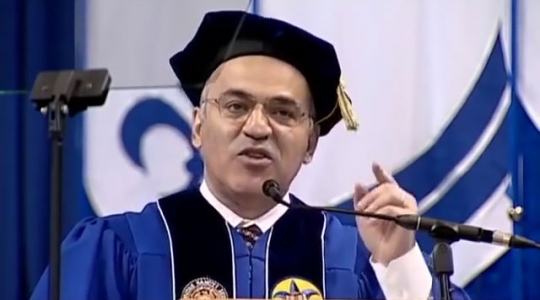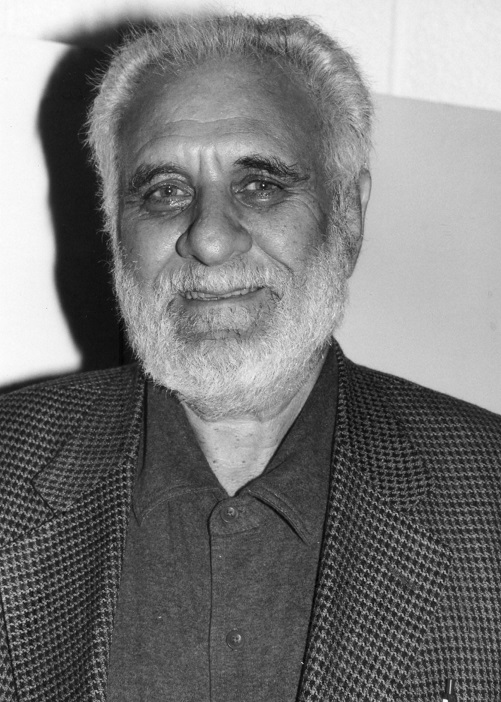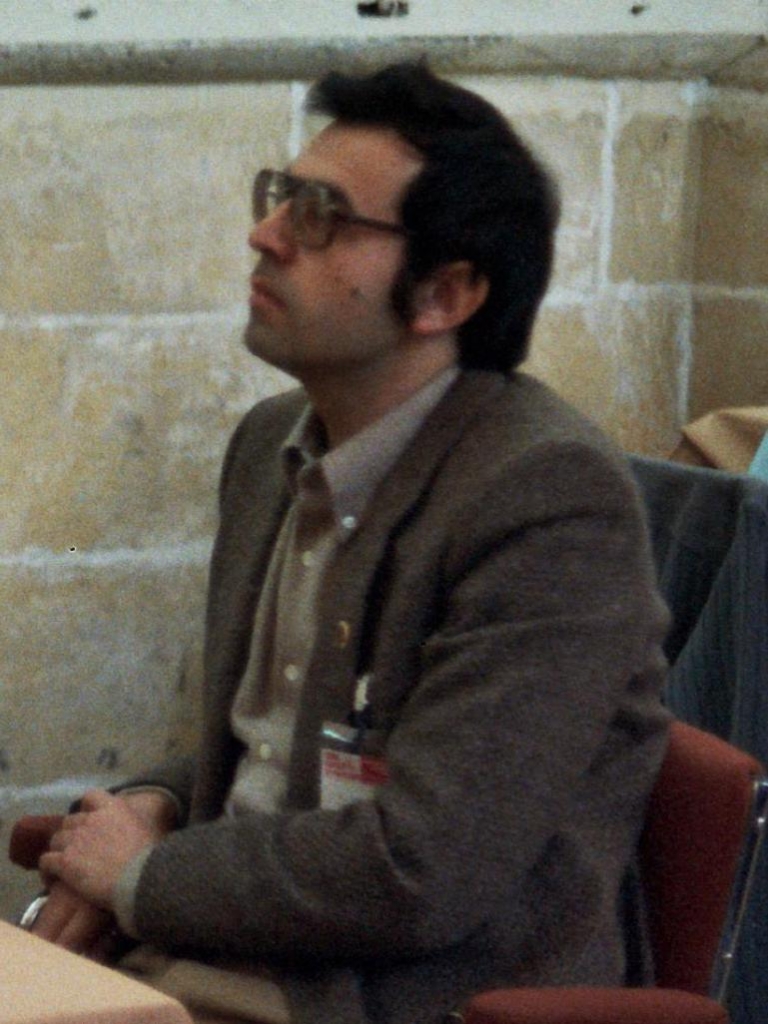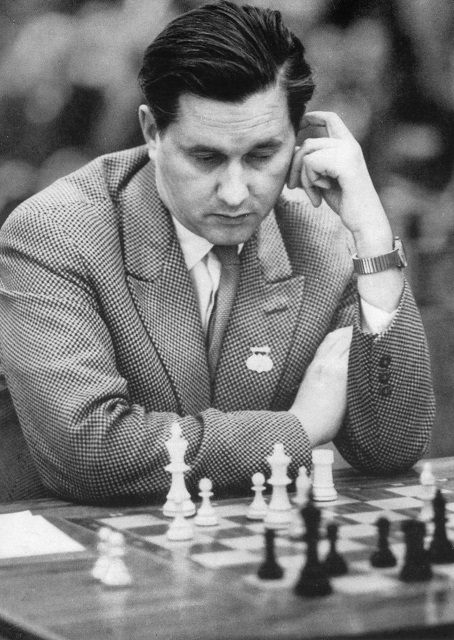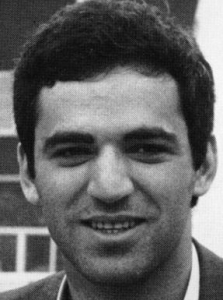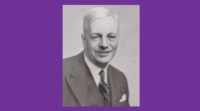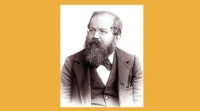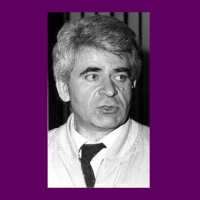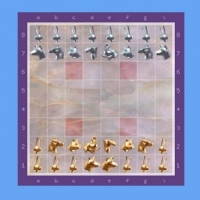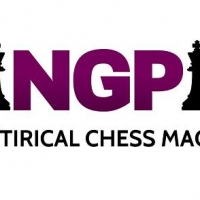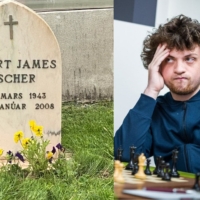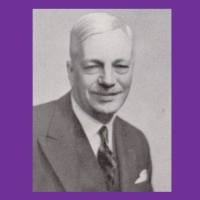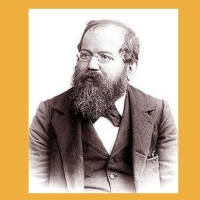John L. Watson
[This withering indictment of the stupidity and arrogance of chess players was written over 16 years ago. It is still relevant today and lends weight to Sarah Hurst’s recent observation that ‘chess brilliance has nothing to do with high intelligence in other areas, but tends to give top players a false idea of their own high intelligence’. We hasten to add ‘some top players’. Pick your own favourites -Ed.]
In most chess publications, there is a justifiable tendency to shy away from social and political issues when they are not directly relevant to a chess story. As a rule, I approve of this policy for a variety of reasons, e.g. (a) chess is a realm in which we can escape from the emotion-laden controversies of the real world; and (b) chess players, regardless of what they may think, normally have no special expertise or competence when dealing with social and political issues. In some ways, the absence of explicit political discussion in most chess journals (aside from debate about chess politics, of course) is similar to its absence in scientific and technical publications. I have never before broached this subject in print, for example.
Inevitably, nevertheless, the chess world is permeated with the political opinions of its practitioners, and both chess publications and organisations cross the line into overtly political territory from time to time. Indeed, such manifestations of the political world in that of chess could be the subject of a fascinating study. In this article, due to some recent ventures by chess players into the political realm, I thought it would be fun to make a few observations on this subject, despite the inevitable anger any such discussion provokes. And Kingpin, as a forum in which just about anyone is allowed to say anything (right?), seems the appropriate place for such observations.
Let me first set some boundaries and state some limitations. Obviously, anything I say about political and social issues will be influenced by my own views on those issues. The reader should be aware of that, and may choose to differ with me on that account alone. So be it. Also, as my experience is primarily with politics inside the United States, my discussion will mainly focus on what I have seen occur in this country’s organisations and publications. I hope that this will still be of interest to those outside the US; my guess is that certain elements of what I say will apply to other countries as well. Finally, this is a short, informal essay, not an academic paper, and I will freely state my opinions about certain beliefs without even attempting to prove that I am right. Naturally, I believe that I could do so to the reader’s satisfaction, given a few hundred pages; but in the meantime, I’ll just have to hope for some common understanding.
Uncle Sam Plays Chess
Before moving on to the recent events which have prompted these musings, let me provide some historical background and observations. During my lifetime, for whatever reasons, explicitly political manifestations in American chess circles have almost always come from the right-wing end of the spectrum. To some extent, I think that American chess players, who do not spend a great deal of time acquiring a political philosophy, are attracted by the simplicity and orderliness of the right-wing model. Perhaps, too, chess players generally tend towards a conservative world view. I don’t know. At any rate, some 30 years ago, the hierarchy of the United States Chess Federation (USCF) included a group of politically-motivated right-wingers who viewed Bobby Fischer’s career almost entirely in terms of a Cold War struggle between good and evil. Young American players reading Chess Life (the official USCF publication, and the only magazine most players had access to) were continually told of Fischer’s virtues (courage, independence, honesty, etc.), and of the perfidy of the (always machine-like) Soviet players. Years later, in retrospect, it is amazing to look at the manner in which even slight glitches in that story were carefully hidden from the readers’ view, which helps to account for the persistence of these primitive stereotypes among American players today.
Larry Evans (photo: Mark Huba)
As the years went on, Chess Life moved back and forth, depending upon its editor, from being a relatively apolitical publication (but always with a couple of highly-politicised right-wing columnists, e.g. GM Larry Evans) to being a promoter of conservative and stridently anti-Soviet views. This latter condition had its most extreme instantiation during the tenure of Larry Parr, a rabid purveyor of political views which could be charitably characterised as well to the right of Ronald Reagan. Parr, in the tradition of the True Believer, put his time not into editing chess articles, but into conceiving of astonishing interpretations (or rather, inversions) of seemingly innocuous chess news, with the purpose of creating explicitly political propaganda. Parr’s political commitment was so rigid that he even turned simple misstatements of fact into unretractable stands of principle, because of their politically correct nature, e.g. defending Evans’ insistence that the challenger in the World Championship had to win two matches before FIDE would give him the title. As a staunch worshipper at the altar of Fischer, Parr also touted various Anti-Communist Heroes to oppose the malevolent and sinister Karpov, most notably Korchnoi (whose life was reinterpreted as a study in all the knightly virtues, a campaign which flagged a bit when people actually began to talk with Korchnoi, but that’s another story).
During this period, another columnist was hired to spread the right-wing faith: GM Lev Alburt, who remains with Chess Life to this day. It’s hard to summarise the many bizarre political views Alburt has floated. As an example, he personally told me in the early 1980s that he thought the US should launch a full-scale first strike nuclear attack on the then-Soviet Union (and, presumably, on his own relatives. Come to think of it…). It took me a few minutes to confirm that he was serious. Alburt was also one of those émigrés who immediately becomes the world’s greatest expert on his adopted country, and his columns at that time included a good dose of his overt right-wing ideology. To be sure, his contemporary articles deal only with chess; but to this day, GM Evans continues to repeat the same tired version of how Fischer – excuse me: ‘Bobby’ – had his title stolen by the Communists, along with stories of their many other misdeeds (real and imagined). For most American readers, this is the only ‘history’ of those events to which they are exposed. The right-wing association with Fischer’s cause is well-illustrated by the US House of Representatives late-1980s Resolution to recognise ‘Bobby Fischer’ [sic!] as the ‘World Chess Champion’. This piece of bloated arrogance was at least in part led by the conservative columnist Charles Krauthammer (in association with Parr and others). I’m sure that the honourable representatives pored over the historical record to verify this bizarre claim, and, of course, never let political considerations interfere with their vote.
Well, that’s a too-brief (but sufficiently boring) overview; I think it helps to explain the context in which a number of these recent politicised controversies have appeared in the chess media. I should emphasise that most of Chess Life reporting over the years (and now) has been (properly) apolitical; the point is that many American players have only been exposed to one particular point of view when the discussion has turned political. And the more recent coverage of Fischer, while nothing like that during the 1970s, is nevertheless limited by a kind of informal censorship which precludes any real criticism. This should shed some light on the following subjects.
Did Keres throw games?
The first politicised controversy I want to discuss is the recent revival of the argument that Keres was forced to throw his games to Botvinnik in the 1948 World Championship tournament. This issue was well-covered in a recent two-part article by Taylor Kingston (see the Chess Cafe archives, for example, at chesscafe.com). People seeing the arguments put forth by James Schroeder and GM Evans for the first time had no way of knowing that they had a huge bias and emotional stake in the anti-Communist implications of this story (not to mention long histories of ignoring and distorting evidence). Kingston himself gives us some idea of the sway political prejudices can exert:
‘Frankly, few things would please me more than to say that Keres, by all accounts the kindest gentleman who ever pushed a pawn, had been cheated by the humourless Stalinist Botvinnik.’
This from someone who never met either man! Anyway, without going into the details, a careful reader of the arguments will soon realise that the whole ‘controversy’ is just a classic case of a couple of people reaching their desired conclusion first, and then trying desperately to find some support for it. Evans (and Schroeder, another of these writers with a political agenda) utterly fail to find even a shred of actual evidence of Keres throwing the games, and so Evans is then reduced to claiming that the games themselves were the evidence. A mistake, since the games make no sense whatsoever if Keres was trying to throw them. Kingston points out several glaring problems with Evans’ claims about the games in his article, but one of the positions used as ‘evidence’ for Evans’ case really clarifies his fanatic commitment to the ideologically proper conclusions. At one point, Keres sets a trap for Botvinnik, with a move which Evans calls ‘incomprehensible’. Well, it is incomprehensible if Keres was trying to lose the game; how would he have covered up the ‘fix’ had Botvinnik fallen for the trap? To make matters worse, Evans’ own stereotyped suggestion in the position could have been implemented at any later point in the game, and wouldn’t have changed the nature of the position at all. (Thanks to John Tomas for pointing out this convincing example.) In fact, the whole ‘case’ is complete rubbish. That isn’t to say that it isn’t possible that Keres was forced to throw games to Botvinnik (although the games themselves make a powerful case against this); just that none of these articles uncovers any evidence to that effect.
Paul Keres
In saying this, I have intentionally excluded hearsay as ‘evidence’. It is interesting in this regard that Taylor Kingston debunks Schroeder’s and Evans’ claims, and ends up with only the opinions of politically-motivated Soviet émigrés. This leads to an amusing general point which I only became aware of gradually. Kingston is very impressed by a conversation with a certain Emanuel Sztein, an émigré who mysteriously claims that ‘forthcoming’ memoirs from Averbakh will reveal something nefarious with regard to the case. Properly frustrated by Sztein’s refusal to say what the memoirs include, Kingston asks:
‘did he [Sztein] believe Keres was coerced in 1948? His [Sztein’s] response: ‘I know it with certainty.’ And Botvinnik was actively complicit? “Yes”.’
I had to laugh aloud upon reading this passage. When Soviet émigrés first began to dot the American chess landscape, I was naturally curious about their views on political issues. Over the years, I have had dozens of conversations with émigrés from the old USSR, and I can confidently state that the one thing I have learned is that when an émigré looks into your eyes and sincerely says that he is ‘absolutely certain’ or ‘sure’ or ‘completely sure’ about some controversial or dubious-seeming point, it can safely be translated into one of (a) ‘I’m not sure at all’, (b) ‘it may be true and it may not’, or (c) ‘I don’t care if it’s true or not, but it sounds good’! In my experience, this seems to be just a widespread and fairly harmless cultural habit; as I found out, ‘absolutely certain’ one day tends to change into ‘I don’t know’ the next, and various émigrés have been ‘absolutely sure’ about unambiguously contradictory claims. The point is, Kingston finds such testimony ‘hair-raising’; but his ultimate conclusion that it is unsupported hearsay is far more appropriate.
Keres – Botvinnik
World Championship tournament, 1948
Here Keres played 21 Re1!?, intending 22 Nf4!. Evans says that this is evidence that he is throwing the game, and suggests the stereotyped but pointless 21 Raf1 instead.
A variant on this politically-motivated form of chess controversy is Fischer’s claim that every Karpov–Kasparov match was fixed (by both players in complicity), and that the ‘proof’ is in the games (subject of a ‘forthcoming’ analysis, of course). Such is the effect of years of propaganda in support of Fischer’s conspiracy claims that this fixed-match assertion is actually seriously discussed by American players (e.g. on the Internet), and given a mysterious assessment of ‘possible’ by some of the political crowd which so misses the thrill of the Cold War. The fact that a theory so inane isn’t simply laughed to death reveals the extent of the ideological and emotional stake so many American players have in the case of Fischer and the Soviets. I don’t think any logical argument here would be useful; if the reader is familiar with these matches and doesn’t understand my point, nothing I say will ever penetrate to him or her anyway.
The Fischer tapes
Similarly, the recent appearance on the Internet of two interviews given by Fischer to a Philippine radio station has elicited some extraordinary and revealing reaction; especially from US listeners. In the interviews, Fischer (speaking to his friend GM Eugenio Torre and a journalist) indulges himself in some obscenity-laced anti-Semitic tirades, and makes a variety of charges against a financial agent employed by him in the US (‘a dirty, secret Jew’ who has changed his name. The Jews all like to do this, you know). He also defends himself against (unnamed) enemies who, he seems to think, devote their every waking moment to ruining his life. It turns out that he has been blacklisted from playing chess for the last 20 years (and here we thought he just didn’t want to play!), while the vast and all-powerful Jewish World Government has orchestrated a variety of plots, ranging from the theft of his Mexican comic books to the falsification of his game scores. The political dimension of this, in case you’re wondering, is as follows: Jews are inseparable from Evil Commies, it turns out, because ‘all the Russian revolutionaries’ were ‘Jews who changed their names’. And, oh yes, the Jews invented the Holocaust; it never occurred. And so forth.
What’s interesting is the chess public’s reaction to all this, revealing a level of logic and sophistication similar to Fischer’s own. About half of the Internet responses to these interviews didn’t even pause to acknowledge the possible problems that such statements raise for Fischer’s credibility; rather, many of them leap immediately to his defence. A favourite theme is that the tapes were faked – it wasn’t Fischer’s voice! – despite the presence of his friend Torre (who was Fischer’s second in 1992) and the familiar Fischer intonations. There are a number of variants on this theme, e.g. listeners give ‘compelling’ reasons to question the tapes’ ‘authenticity’, as well as explanations of how sophisticated experts with the right equipment could quite easily rig the whole interview. Some were even outraged that the tapes were allowed to be heard, considering the likelihood of their fraudulence.
A second group of listeners accepted the tapes’ legitimacy, but tried to defend or justify their content. One direct defence was that there was ‘truth in what he was saying’, whereas another simply cited Fischer’s ‘heroic contribution to the victory of Western civilisation against the dreadful communism/Stalinism’s threat’. I suppose this is the point to interject that, unfortunately, too many people on the American chess scene are, shall we say, too ‘concerned’ with the Jewishness or otherwise of other players. This sad point of view is associated with extreme variants of the politics of both the Left and Right. At any rate, several more enlightened listeners indeed acknowledged that Fischer had somehow recently become deranged about that subject (they seemed quite unaware that he was also virulently anti-Semitic and discovered even more conspiracies around him 25 years ago), but they also emphasised that, after all, ‘it is clear that he has been wronged’, that the ‘true crimes against him have driven him mad with frustration’, or that he had been ‘ripped off by scumbag thieves’. ‘Don’t let us fail to notice that this man has been deeply wronged’, trumpeted one listener, and another was ‘truly sympathetic for the way he’s been f**ked over’, and so on. A particularly compelling theory proposed that Fischer was ‘being held hostage by some anti-Semitic group’ (those people often take hostages, you know).
To me, the interesting aspect of this last group is that, just as with Evans’ absurd arguments about the stolen world championship or Fischer’s many claims of Soviet plots, such emotionally-committed followers never thought to question whether Fischer really was ‘screwed’ or the victim of a conspiracy, or that his latest version of events might be (in fact, given his history, very likely is) a false one, unsupported by any evidence. Somehow, in their minds, if Fischer isn’t a victim, then the Commies were right after all, and the Free World has suffered a setback. Instead of throwing into relief the lack of logic and disregard for facts which has accompanied Fischer’s accusations for 35 years, the interviews just seem to have added fuel to the idea that this poor man, even if driven nuts, has been done so by his omnipresent enemies. After all, he says so!
To their credit, a third group of listeners either bemoaned or condemned Fischer’s rabid spewings, but even a remarkable number of those said that he had been a ‘hero’ to them, and clearly felt that his ravings were a recent problem, or limited to the conceptual mistake of anti-Semitism. My guess is that the historical claim that Fischer was hounded from chess and stripped of his title by an unfair and Soviet-driven FIDE is still solidly entrenched in most American players’ minds. Parr and Evans have done their job well; they would have made excellent Soviet commissars.
Kasparov’s strained thinking
Turning away from Fischer at last, what do we make of the political inclinations of the world’s currently strongest player, Mr Kasparov? In some ways, Kasparov’s political pretensions are more embarrassing than Fischer’s; he doesn’t have the excuse of insanity, for one thing. Self-portrayed as an anti-Communist rebel (and thus posing the pro-Fischer right wing a difficult problem of who to believe), Kasparov has managed to meld his political views and self-interest from his days as a privileged Communist Party member (and as one of Fischer’s name-changers, in fact!) to his current pose as someone who fought a noble single-handed battle against the Communist chess establishment and is an advocate for capitalism, freedom, and ‘democracy’. A tough PR act, to say the least; but Kasparov has taken Agassi’s ‘image-is-everything’ principle to heart and, using this story, has successfully cosied up to the monied Westerners who count. He is currently serving as a ‘contributing editor’ on the Wall Street Journal editorial page, a notorious haven for right-wing hacks who, much like Soviet journalists of yore, are paid by ‘think tanks’ to pour out politically-correct and 100% preordained conclusions and ‘analysis’ of political and socio-economic issues. Kasparov’s editorials fit right in; they are embarrassing reproductions of vulgar far-right rhetoric. He simply parrots or even directly copies the standard lines, apparently doing no research whatsoever on the topics he presumes to expound about. Like other ex-Soviets, he imagines himself expert in the area of US and Western foreign affairs. Now, granted that Kasparov has a lifelong interest in and may well be worth listening to on issues pertaining to Azerbaijan, Armenia, and the Soviet Union, his expositions on Western politics are painful to read. It’s as though the world’s most accomplished violinist used his prestige to start writing articles in specialty chess magazines which advocate 1 g4 or 1 d4 e5 as the best openings. And, as one reads the articles, it becomes transparently obvious that they are written with a Basman or Bücker article on those subjects in hand, copying the analysis and even the rhetorical flourishes, and that the author hasn’t done any work of his own or even bothered to understand the implications of the ideas presented.
As an example, and again in the grand style of the Soviet propagandists (but from the right, of course), Kasparov recently reproduced the standard apologetics for two repressive dictators friendly to Western business interests (and beloved by the Wall Street Journal): Franco and Pinochet. His ‘analysis’ would do Pravda proud; he reveals a complete ignorance of the history of the countries involved, and adopts the unbelievably strained logic of the ‘benevolent authoritarianism’ school, with characterisations of countries which are about as accurate as Fischer’s portrayal of World Jewish Government, and which compare unfavourably with the quality of analysis which 1 d4 e5 advocates provide. Kasparov’s ideas about democratically-elected governments are perfectly reflected in his statements that ‘the people’ of Spain and Chile ‘showed the strength’ to make ‘the choice’ for Franco and Pinochet. Yes, Garry, just as the people of the Ukraine (or Latvia) had the strength to choose Stalin and Brezhnev. Somehow, actual elections of undisputed fairness and even parliamentary representation are absolutely unconnected to ‘democracy’ in Kasparov’s strained thinking. This may well explain the consistently dictatorial approach he has taken to chess politics as well.
It gets even sillier when Kasparov wrings his hands about ‘a dominant elite of liberal intellectuals’ whose ‘Marxist’ and even pro-Communist theories are ‘so fashionable in prestigious universities and magazines’. One has to wince in embarrassment; has Garry been taking classes at Harvard and Stanford? How has he managed even to locate these most fantastic of stereotypes, which correspond to no reality outside of the minds of uneducated talk-radio-show hosts and leaders of militia movements? The whole display is sad to watch; what reader would ever suspect that Kasparov (or indeed, Fischer) is in fact a great creative genius in the field he actually has knowledge of?
Well, Kasparov’s political ravings could be an infinite subject, so let me wrap things up. There seems to be a common thread in the examples I’ve dealt with. Certain chess players, with their large egos and active minds, seem to think that the first sweeping theory which appeals to them, however simplistic, must be the truth and, further, that they are instantly empowered to spread that truth to an ignorant humanity. In the case of both Fischer and Kasparov, they have simply internalised a particular (elementary) model which was developed by others to meet certain propaganda needs. For some reason, the model seems to fulfil an intellectual and/or emotional need of their own. Thus, it would be threatening for either of them to do any sort of research, which might, to say the least, call the validity of the model into question.
Fortunately, I don’t believe that most top chess players are predisposed to this sort of amateur sideline. It is hard to imagine, for example, Anand (or Adams, or Svidler) developing and promoting such infantile theories or working so hard to rewrite history. At some point in the process, one feels, a degree of caution or common sense would intervene, if only due to their sense of humour or the perspective granted by a degree of humility. I hope that this article has at least predisposed a few chess players to be more sceptical of things political which are presented to them via the chess media. In the end, as limiting as it may appear, the complete separation of chess and non-chess politics seems to be a very healthy thing, and taking my own advice, I will return to that policy with a clear conscience.

